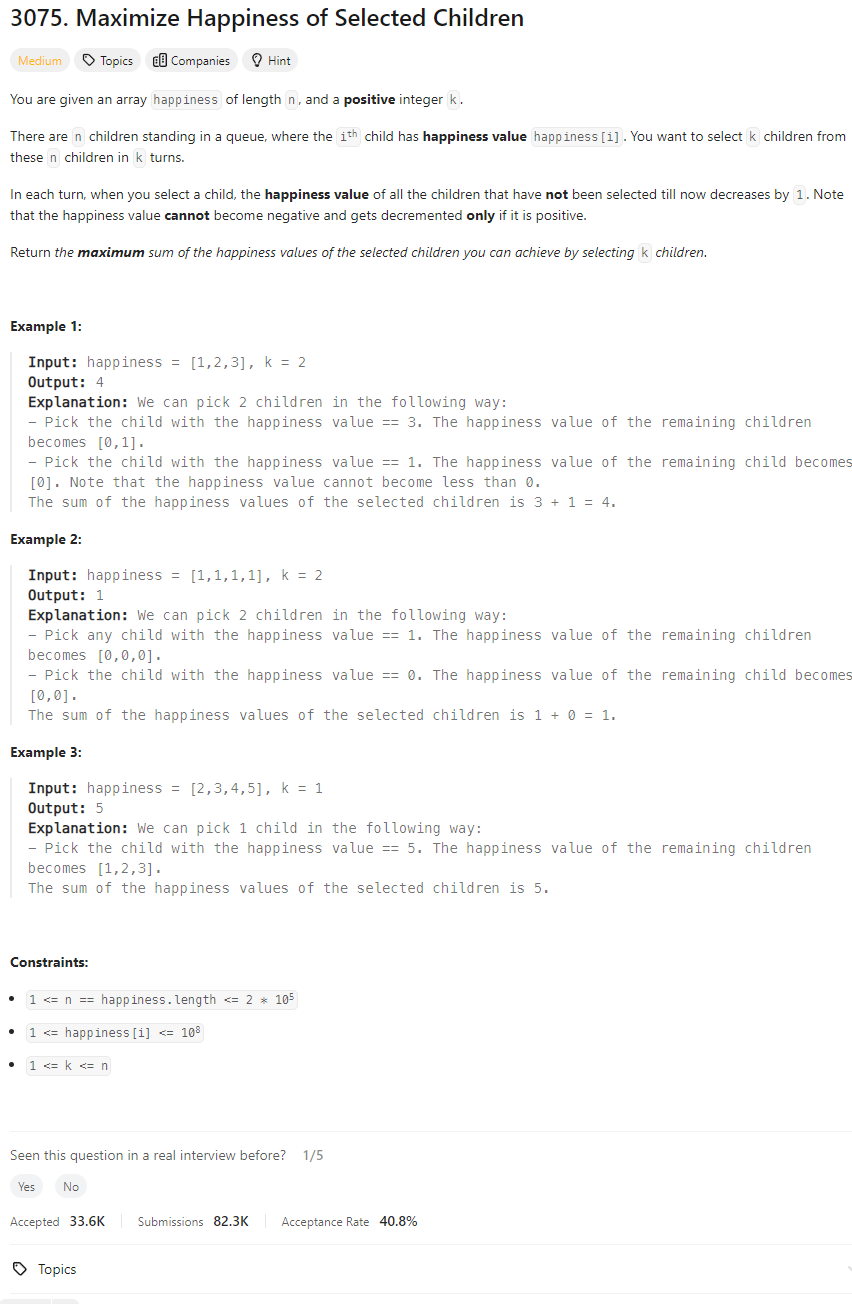Problem of The Day: Maximize Happiness of Selected Children
Problem Statement

Heap Approach - TLE
class Solution:
def maximumHappinessSum(self, happiness: List[int], k: int) -> int:
max_heap = []
for happy_val in happiness:
heapq.heappush(max_heap, happy_val * -1)
res = []
while max_heap and len(res) < k:
res.append(heapq.heappop(max_heap) * -1)
curr_heap = []
while max_heap:
val = (heapq.heappop(max_heap) * -1) - 1
if val > 0:
heapq.heappush(curr_heap, val * -1)
max_heap = curr_heap
return sum(res)
Improved Heap Approach - passed
Intuition
My thought here is to maximize the total happiness sum by selecting the highest happiness values from the input list. Since we can only choose k values, we need to prioritize the highest ones.
Approach
To implement this, I’ll utilize a max heap to efficiently extract the highest happiness values. I’ll push the negated values into the heap to simulate a max heap. Then, I’ll iterate through the heap, popping elements and subtracting an index value from them to ensure we prioritize the earlier elements. We’ll continue this process until we have selected k values or the heap is empty.
Complexity
-
Time complexity: Pushing all elements onto the heap takes O(n _ log(n)), where n is the number of elements in the input list. Popping elements and constructing the result list takes O(k _ log(n)), as we perform k pop operations. Overall, the time complexity is O(n _ log(n) + k _ log(n)).
-
Space complexity: O(n) for storing the heap and the result list.
Code
class Solution:
def maximumHappinessSum(self, happiness: List[int], k: int) -> int:
max_heap = []
for happy_val in happiness:
heapq.heappush(max_heap, happy_val * -1)
res = []
i = 0
while max_heap and len(res) < k:
val = (heapq.heappop(max_heap) * -1) - i
if val > 0:
res.append(val)
i += 1
return sum(res)
Editorial Solution
Approach 1: Sort + Greedy
class Solution:
def maximumHappinessSum(self, happiness: List[int], k: int) -> int:
# Sort in descending order
happiness.sort(reverse=True)
total_happiness_sum = 0
turns = 0
# Calculate the maximum happiness sum
for i in range(k):
# Adjust happiness and ensure it's not negative
total_happiness_sum += max(happiness[i] - turns, 0)
# Increment turns for the next iteration
turns += 1
return total_happiness_sum
- Time: O(nlogn)
- Space: O(n)
Approach 2: Max Heap / Priority Queue + Greedy
class Solution:
def maximumHappinessSum(self, happiness: List[int], k: int) -> int:
# Convert the list into a max heap by inverting the happiness values
# Python's default heap data structure is a min heap
max_heap = [-h for h in happiness]
heapq.heapify(max_heap)
total_happiness_sum = 0
turns = 0
for i in range(k):
# Invert again to get the original value
total_happiness_sum += max(-heapq.heappop(max_heap) - turns, 0)
# Increment turns for the next iteration
turns += 1
return total_happiness_sum
- Time: O(nlogn + klogn)
- Space: O(n)